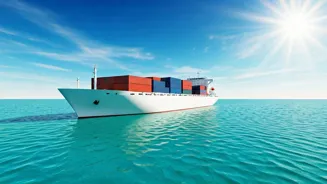Murmu's Vision Unveiled
President Droupadi Murmu’s recent address underscored a pivotal perspective on global trade. She urged the Indian populace to view the hurdles presented
by international commerce as opportunities for advancement. This forward-thinking approach necessitates a strategic shift, prompting a reevaluation of existing trade policies and practices. The essence of her message resonates with the ambition to position India favorably on the global stage, fostering economic resilience and sustainable development. Embracing this viewpoint is crucial to harness the full potential of international trade. This includes encouraging indigenous industries, upgrading infrastructure, and nurturing international partnerships. Ultimately, it forms the foundation for a more prosperous India.
Navigating Trade Challenges
Global trade landscapes frequently encounter challenges such as economic downturns, geopolitical tensions, and trade barriers. These factors can significantly affect a country's export and import dynamics. India must proactively manage these obstacles, developing robust strategies to mitigate their impact. This could include diversifying trade partners to lessen reliance on any single market. Furthermore, investing in technological advancements and improving infrastructure is vital to enhancing competitiveness. Streamlining trade procedures and reducing logistical bottlenecks can further support the creation of a more streamlined and efficient trading environment. Successfully navigating trade challenges requires adaptability, foresight, and a commitment to constant improvement.
Seizing the Opportunities
The call to transform trade challenges into opportunities entails a strategic focus on exploiting various avenues for growth. This encompasses several key strategies such as identifying untapped markets, establishing favorable trade agreements, and fostering innovation within domestic industries. India can enhance its global position by promoting and supporting its indigenous products and services. Furthermore, embracing digital technologies for trade, like e-commerce platforms, can expand access to international markets, boosting trade volume. Investment in skills development and education, particularly focusing on trade-related expertise, is essential to prepare the workforce to meet the requirements of the global marketplace. This comprehensive approach will bolster India’s economic prospects.
Strategic Alliances and Partnerships
Collaboration through strategic alliances and partnerships serves as a fundamental element in transforming trade challenges into opportunities. Forming alliances with other nations creates favorable conditions for increased trade, knowledge exchange, and shared resources. India can gain from partnerships through bilateral trade agreements, regional economic collaborations, and global initiatives. Strengthening these relationships allows India to improve its access to various markets and reduce trade-related risks. Such partnerships should emphasize the mutual benefits of sustainable trade, which prioritizes inclusive growth. This approach not only boosts economic cooperation but also supports long-term prosperity and stability. Active participation in organizations, along with strategic partnerships, is important for India's international trade strategy.
Fostering Economic Resilience
Creating economic resilience stands out as a key objective to manage the uncertainties and volatility inherent in international trade. This involves promoting policies that diversify export portfolios, protect domestic industries from foreign competition, and reduce reliance on specific markets. India's capacity to weather economic storms will be enhanced by constructing a robust, adaptable trade environment. Another vital aspect of this is building up supply chains and ensuring reliable access to resources. Investing in financial stability mechanisms, which include currency hedging and risk management tools, will help to buffer any adverse impacts of global trade changes. A flexible and resilient economy is well-equipped to transform challenges into opportunities. Thus, India's economic future is secured by taking a proactive approach.












